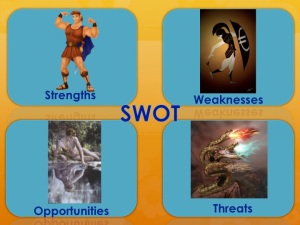Parenting is, arguably, world’s toughest job!
The next probably is working out/ losing weight
And ofcourse, after that is managing a large work force 🙂
The correlation is not apparent – but, will be soon enough.
This thought actually got sparked off this morning as I was in my Aerobics class. I realised that over the one year I’ve been attending these classes, my trainer (and good friend) has considerably upped the level of the exercise regimen. This is actually sensible, since the bulk of her class is regulars – and obviously with continuous exercise, general fitness levels have increased – hence higher challenge levels required..In fact most students are now actively into running.
But, what I also realised is that N aims her class at the “stars” in the class – those as-fit-as-her, and as-Nazi-ish-about-fitness-as-she-is, people. Again, understandable, since those stars are a) able to follow the regimen best, b) show the effects best, but most importantly, c) challenge her to work harder at the training.
However, a corollary of N “speaking” to the best is that I get the feeling (probably unwarranted) that she doesn’t then focus so much on the “lesser beings” – people like me. I also ofcourse always rationalise it by telling myself that anyway I am “cheating” – i.e., doing many of the routines at less than 100% compliance – and, at least, looking at the stars keeps the benchmark always within sight. Having said that, I still sometimes feel that when I DO manage to get to the 100% level, it would be great if I would get those treasured words of praise fm the trainer – “well done”. But, my image of being the lesser being probably colors then the trainer’s view of me, and then she doesn’t look at me as often as she does at the stars, and so misses the occasional stellar performances I do manage and so I don’t do as well maybe next time…and so…and so…
(When she DOES utter the “good job, S!” magic words, I am tempted to work harder/ cheat lesser/ push myself more)
Interestingly, this is a direct contrast to what I do when I teach English to a 4th/5th grade class at a Kannada medium government school. Generally, most of my attention goes towards the “row 1” students – those that find it difficult to grasp most lessons, knowing that if they “get” most of the lesson, the rest certainly will!
Now, how does this fit in with parenting?
As with most parents, I have 2 kids who are diametrically apart in temperament, behavior, likes, dislikes, strengths and improvement areas. One is a dreamer, the other is a doer. One is a morning person, the other has to be dragged out of bed after loooong nights reading. One likes chinese food, the other doesn’t touch noodles — and so on.
But strangely enough, one lesson I found myself repeating for both in recent times is that of – self image, and perception management related to it.
Started with younger child – she is a fiend if you ever had one. Loud, brash, the world-is-my-friend, don’t-care-about-anything, finds-humour-in-everything kind of fiend. Bright actually, but “does” terribly at school – I have been called to school at least 6 times in the past 2 years for would-be-grave one-on-one lectures by her teachers (“would be” because I refuse to be cowed down by these strictures on the child). Each teacher tells me – “knows everything, if only she would be neater in her work, submit her work on time, not get distracted and want to go for frequent toilet breaks etc etc…) Now, by the way, P WORKS at this image – she thinks its cool to be brash/ funny/ don’t care-ish.
However, this post is not about what to do with children like this (though that is a real problem for sure), but the problem that occurs as a result – ofcourse, a few teachers “get” the underlying personality of the child, I am thankful to say – however, many of them believe the image is reality – and treat her accordingly! So, if there is a disruption in the class, most fingers point at P. More importantly, once branded with the image of “casual worker”, when she does turn it better work, its sometimes not noticed – and on the few occasions that she is serious about some stuff in school, there is a chance she gets overlooked.
P and I have had frequent serious chats about “how to manage” your image or perception (in so many words!). These serious chats are peppered with examples of her two “best friends” – one of whom is truly a “good child” and is widely recognised for that, and the other is more like P, but has managed to retain an image of a “good child” (in their lexicon ofcourse, to be branded “good” is probably almost abuse! 🙂 )
Older child faced this too – she used to be keen on Indian classical dance when younger. As she entered her teens, interests changed – and she is now passionate about dramatics. But, her lingering image of “dancer” leads school to pick her for dance related events and not theatre. Being older, and after some counseling, she did manage to assert her interests – and is now a happy camper. But the point is, this “change of image” took some doing!
Now think about organisations – doesn’t this happen there too? How often have you had complaints at appraisal time from folks saying – “my manager doesn’t think I am good enough – and so has not given me x or y job”. It’s probably true, because in the natural order of things, the manager WILL pre select those he or she thinks are the best bets for any given job – thats what managers do – they “optimize” or “manage” resources. The question, however is, how much of that “image” is reality and how much just perception not directly related to reality?
A related point here is then – as the trainer/ teacher/ manager/ leader, do you address the “stars” or the “dogs”, or do you stay somewhat in the middle – my favourite – the golden mean!
Nature certainly selects the “fittest” – if Darwin is to be believed! (the fittest evolve into next generations while the others gradually die down) So, my trainer and P’s teachers seem to have precedent! Incidentally, I find this Theory of evolution video immensely funny! :
But, actually, on the other hand, nature ALSO looks at the lowest common multiple – think about Limiting factors in Photosynthesis ( the rate of photosynthesis is limited by the least amount of necessary resource available – see video for a slightly long winded reminder):
And ofcourse, in most organisations we work neither at the highest nor the lowest but at the average. This is what the bell curve does for you – it force-fits everyone in the organisation into a mean +/- standard deviation curve – and treats exceptionally the outliers. The problem with that? Think about the statistician who drowned while crossing a river that was on average 6 inches deep! (A nice explanation of averages – and what outliers do to them can be found if you click on the link)
In a diametrically opposite view, Malcolm Gladwell made famous his theory of outliers – where he correlated success to the amount of time spent working at that skill, and some factors not quite under control of the protagonists.
The question arising from of all of this dilatory musing is really this:
If you are a leader/ parent/ trainer: Do you focus on the outliers, or the average in terms of managerial/ parental/ teacher attention. And, if the former, should it be the “LCM” (those who need extra input); or the “HCF” (in other words, the stars).
If you are the led/ managed/ taught: How do I get a sense of whether I am LCM, average of HCF – BEFORE painful yearly evaluation sessions/ how do I manage the perception of my being LCM if I am not/ how do I match my self perception to that of the outside world?
Any answers? Suggestions?
Meanwhile,
The problem of Least Common Multiple came forth funnily in the movie Father of the Bride. Enjoy!





















